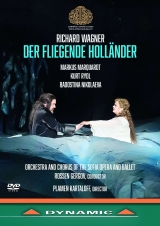Während der Ouvertüre liegt die grell geschminkte Senta auf einem Feldbett in einem unförmigen, mit Plastik ummantelten Tunnel und fährt dann mit diesem Bett wild gestikulierend in ein kitschig-hässliches Plastikmeer, landet dann auf einer breiten Treppe, wird ohnmächtig und fällt in Eriks Arme. Dort, wo das Bett stand, im Plastiktunnel, wird das Bild des Holländers sichtbar, dem sich Senta mit wilden, unbeholfenen Gesten zuwendet, während Erik sie festzuhalten versucht.
Eine Plastikplane wird heruntergerissen und doch ein breiteres Loch kommt der Chor und singt grausig schlecht. Dann bemüht sich Daland, Wagners Musik herüberzubringen und versagt mit Vibrato und approximativem, grausam intoniertem Gesang. Der Steuermann singt pathetisch von seinem Mädel, weil er ja vom Meaar zurück ist und bittet den Südwind, er solle doch meaahr blasen. Hohe Töne werden gewürgt, von jugendlichem Drang keine Spur.
Und dann kommt der Holländer, umgeben von kitschigen Science Fiction-Figuren. Die Frist ist um. …Ja ob des Gruselgesangs, ist die tatsächlich um und ich schalte ab, nicht zuletzt auch wegen des approximativ spielenden Orchesters und des saft- und kraftlos dirigierenden Rossen Gergov. So einen Schrott habe ich schon lange nicht mehr vorgesetzt bekommen.
During the overture, the garishly made-up Senta lies on a camp bed in a shapeless tunnel encased in plastic and then, gesticulating wildly, drives this bed into a kitschy-ugly sea of plastic, lands on a wide staircase, faints and falls into Erik’s arms. Where the bed was, in the plastic tunnel, the image of the Dutchman becomes visible, to whom Senta turns with wild, awkward gestures, while Erik tries to hold her.
A plastic sheet is torn down and the chorus enters through a wider hole and sings badly. Then Daland tries to convey Wagner’s music and fails with vibrato and approximate, cruelly intoned singing. The Steuermann sings pathetically about his girl because he is back from the ‘Meaar’ and asks the south wind to blow ‘meaaahr’. High notes are strangled, no trace of youthful urge.
And then the Dutchman arrives, surrounded by kitschy science fiction figures. Die Zeit ist um…, indeed, because of the creepy singing, the bad choir, the approximate playing of the orchestra and Rossen Gergov’s powerless conducting: I switch off, concluding that I haven’t heard such garbage for a long time.

























